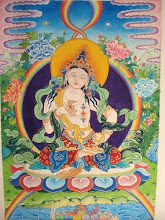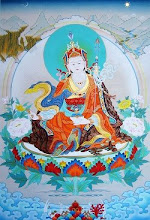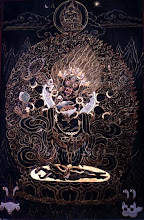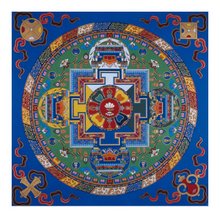Some of you may be wondering what's going on, why I'm writing this blog, and what I'm doing going to Nepal. You may be sorry you wondered.
A couple of months ago I posted the following to the first version of A Full Thangka, a forum for family and a few close friends to discuss my interest in pursuing a new interest. That blog has now been retired, hence the titular II here, but I thought it might help new comers to share the following.

(15 December 06) The one question I’ve been asking myself again and again the last couple of years is this: What would I do if I had free choice to do anything I wanted, unencumbered by any other consideration?
It seems like a simple question, but how often do we seriously consider it, let alone act on it?
So often when it comes to deciding on where to live and what kind of work to do, it seems our choices are based on financial considerations – how to pay the bills? How to save for the future?
But what if we didn’t have to worry about that at all? What if we could do whatever we wanted?
At first I felt indulgent and foolish for even thinking about it. But the more I considered it, the more rational the question seemed. Why should our decisions be based on finance? Why not do what we want to do? Of course if we lack the necessities, then we really don’t have much choice but to worry about how to pay the rent and buy food. But Mutsumi and I are beyond that, so where is the need to keep worrying about money and the future? When is the time we start living in the now, and stop worrying about what might be?
So I began to think about it more seriously, about my heart’s desire, about the thing I would really like to spend some time on.
Surprisingly, I couldn’t answer the question.
There is nothing that I longed terribly to do, unlike my friend who if given the chance would be happy to spend the rest of his life playing music. I realized sadly that I have become impoverished, that I no longer have any dreams, no desire for some free time just so I can pursue my interest.
Sure, I’d be happy to spend a few years traveling. I’d also be happy to spend a good chunk of time reading books, watching films, and listening to music. But those activities are mostly passive, activities in which you experience things that others have created. There is nothing that I really wanted to engage.
So, I gave some thought to that. What is it that I would like to spend time doing? Not something that I would like to make money with. Not some skill that will help me at some time in the future, but something I’d like to do now, something to wrap my mind around, something to be engaged with, something that I do for that thing’s sake.
Cooking. And thangka. Those are the two answers I came up with.
Those that know how Mutsumi and I live might find laughable the idea that I’m interested in culinary arts. I hardly do any of the cooking these days, the kitchen being mostly Mutsumi’s province. But I do love to eat, especially very fine food, a bad habit I picked up a couple of years ago from our German friend Chris, who so thoroughly enjoyed eating a meal it was a pleasure simply to sit at the same table and bask in his gusto.
So what could be better, I thought, than learning how to prepare fine food? It’s creative, it provides sustenance, it comes in a number of cultural varieties, and if nothing else gives you the means to live healthily for the remainder or your life.
I looked into schools and programs and even had a brief correspondence with a chef that is a graduate of one of the schools I was looking at. What I discovered is that cooks spend most of their lives on their feet, that they work long hours, that the kitchen is a high-pressure environment, and that good training costs a great deal of money.
Bringing up money as a reason not to pursue cooking sounds a bit contradictory, I know, but this isn’t about throwing away everything I have. It’s not about trying to undo all the work of the last 20 years. It’s not about becoming an ascetic. It’s about finding something about which I can be passionate, finding a new me. A me that with any luck will live a few more years and will need some of the funds that have been accumulated. And a new me who most definitely doesn’t want to work long hours under excessive pressure.
Painting, though perhaps not as financially rewarding, is a slower, more relaxed activity that doesn’t have to be done to the clock.
Perhaps most of you have never heard of thangka. It’s an ancient form of Buddhist painting that originated in the Himalayas, mostly among the Tibetans, a form of art that I remember first coming into contact with during my two month volunteer service in Nepal nearly 10 years ago. I was so impressed with the style that I brought home a very large example, which hangs on our living room wall. And that was the beginning of our Buddhist art collection. You’ll also find in our home paintings from Korea and Sri Lanka; banners and brocades from Nepal; and statuary from Thailand, Laos, Sri Lanka, Nepal and Japan.
While an interest in Buddhist art has been ongoing for almost a decade, something that goes back even further is an interest in drawing.
I grew up infatuated with comic books and spent no small amount of time as a teenager and again as a young adult sketching. When I was considering going back to college for my Bachelor’s degree, one option I investigated was attending the Art Institute of Atlanta, going so far as to have an interview with one of the admissions officers. I gave that up for history at Georgia State University. Now I’m not sure why, but perhaps I lacked confidence in my ability and thought there was little chance of ever becoming a professional artist.
I didn’t, though, give up all interest in art. In 1984, back at university and working at Kinko's, I fell in love with my first Apple Macintosh. (Remember the 128? No hard drive and the entire operating system and applications on one floppy disc!). In spare hours at the school computer lab and at Kinko’s I learned the basic of computers as well as graphic layout and design.
Following graduation I stayed on with Kinko’s running a desktop publishing desk, where my days were occupied designing and producing documents, everything from simple resumes to magazine-like publications. At the same time, I was in my off hours indulging my interest in comics and drawing with a series of self-published comic books (which are too embarrassing to even think of now!).
And then I was off to Japan in 1988. Shortly after I arrived I studied calligraphy for about a year, but since haven’t drawn much of anything except perhaps a few lame sketches on a blackboard to help explain a story or illustrate a bit of grammar.
Apparently, though, the interest is still there – and waiting to be rediscovered.
#
 My first day of school was rather unremarkable, I suppose, except for having the chance to meet Khyentse Yangsi Rinpoche, the 14-year reincarnation of the master who founded the monastery where I'm studying. He was in town today and holding audience, so the woman who has been my contact at the school arranged for some of the foreigners to meet him and receive his blessing.
My first day of school was rather unremarkable, I suppose, except for having the chance to meet Khyentse Yangsi Rinpoche, the 14-year reincarnation of the master who founded the monastery where I'm studying. He was in town today and holding audience, so the woman who has been my contact at the school arranged for some of the foreigners to meet him and receive his blessing. 



























